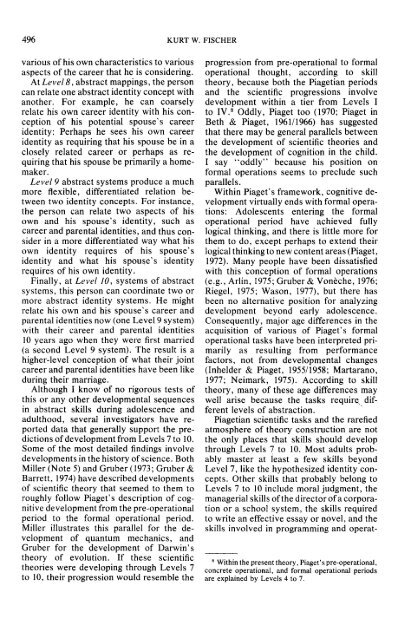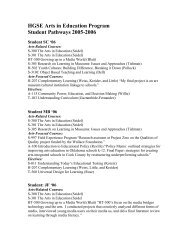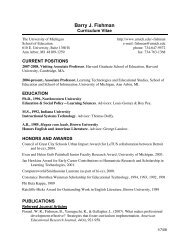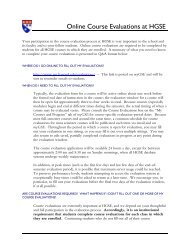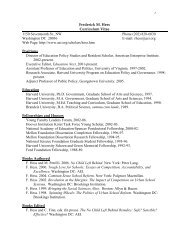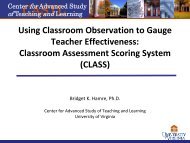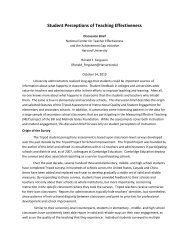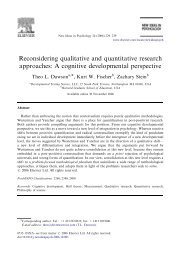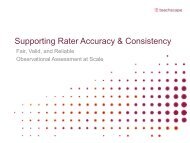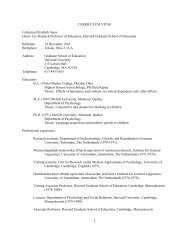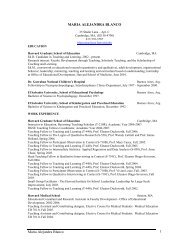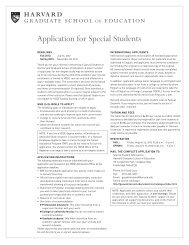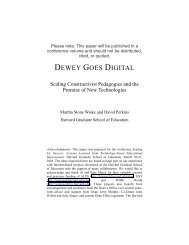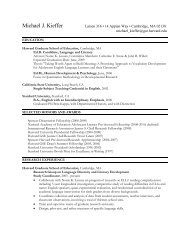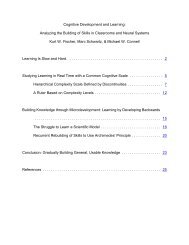Psychological Review - Harvard Graduate School of Education ...
Psychological Review - Harvard Graduate School of Education ...
Psychological Review - Harvard Graduate School of Education ...
You also want an ePaper? Increase the reach of your titles
YUMPU automatically turns print PDFs into web optimized ePapers that Google loves.
496 KURT W. FISCHER<br />
various <strong>of</strong> his own characteristics to various<br />
aspects <strong>of</strong> the career that he is considering.<br />
At LevelS, abstract mappings, the person<br />
can relate one abstract identity concept with<br />
another. For example, he can coarsely<br />
relate his own career identity with his conception<br />
<strong>of</strong> his potential spouse's career<br />
identity: Perhaps he sees his own career<br />
identity as requiring that his spouse be in a<br />
closely related career or perhaps as requiring<br />
that his spouse be primarily a homemaker.<br />
Level 9 abstract systems produce a much<br />
more flexible, differentiated relation between<br />
two identity concepts. For instance,<br />
the person can relate two aspects <strong>of</strong> his<br />
own and his spouse's identity, such as<br />
career and parental identities, and thus consider<br />
in a more differentiated way what his<br />
own identity requires <strong>of</strong> his spouse's<br />
identity and what his spouse's identity<br />
requires <strong>of</strong> his own identity.<br />
Finally, at Level 10, systems <strong>of</strong> abstract<br />
systems, this person can coordinate two or<br />
more abstract identity systems. He might<br />
relate his own and his spouse's career and<br />
parental identities now (one Level 9 system)<br />
with their career and parental identities<br />
10 years ago when they were first married<br />
(a second Level 9 system). The result is a<br />
higher-level conception <strong>of</strong> what their joint<br />
career and parental identities have been like<br />
during their marriage.<br />
Although I know <strong>of</strong> no rigorous tests <strong>of</strong><br />
this or any other developmental sequences<br />
in abstract skills during adolescence and<br />
adulthood, several investigators have reported<br />
data that generally support the predictions<br />
<strong>of</strong> development from Levels 7 to 10.<br />
Some <strong>of</strong> the most detailed findings involve<br />
developments in the history <strong>of</strong> science. Both<br />
Miller (Note 5) and Gruber (1973; Gruber &<br />
Barrett, 1974) have described developments<br />
<strong>of</strong> scientific theory that seemed to them to<br />
roughly follow Piaget's description <strong>of</strong> cognitive<br />
development from the pre-operational<br />
period to the formal operational period.<br />
Miller illustrates this parallel for the development<br />
<strong>of</strong> quantum mechanics, and<br />
Gruber for the development <strong>of</strong> Darwin's<br />
theory <strong>of</strong> evolution. If these scientific<br />
theories were developing through Levels 7<br />
to 10, their progression would resemble the<br />
progression from pre-operational to formal<br />
operational thought, according to skill<br />
theory, because both the Piagetian periods<br />
and the scientific progressions involve<br />
development within a tier from Levels I<br />
to IV. 8 Oddly, Piaget too (1970; Piaget in<br />
Beth & Piaget, 1961/1966) has suggested<br />
that there may be general parallels between<br />
the development <strong>of</strong> scientific theories and<br />
the development <strong>of</strong> cognition in the child.<br />
I say "oddly" because his position on<br />
formal operations seems to preclude such<br />
parallels.<br />
Within Piaget's framework, cognitive development<br />
virtually ends with formal operations:<br />
Adolescents entering the formal<br />
operational period have achieved fully<br />
logical thinking, and there is little more for<br />
them to do, except perhaps to extend their<br />
logical thinking to new content areas (Piaget,<br />
1972). Many people have been dissatisfied<br />
with this conception <strong>of</strong> formal operations<br />
(e.g., Arlin, 1975; Gruber & Voneche, 1976;<br />
Riegel, 1975; Wason, 1977), but there has<br />
been no alternative position for analyzing<br />
development beyond early adolescence.<br />
Consequently, major age differences in the<br />
acquisition <strong>of</strong> various <strong>of</strong> Piaget's formal<br />
operational tasks have been interpreted primarily<br />
as resulting from performance<br />
factors, not from developmental changes<br />
(Inhelder & Piaget, 1955/1958; Martarano,<br />
1977; Neimark, 1975). According to skill<br />
theory, many <strong>of</strong> these age differences may<br />
well arise because the tasks require v different<br />
levels <strong>of</strong> abstraction.<br />
Piagetian scientific tasks and the rarefied<br />
atmosphere <strong>of</strong> theory construction are not<br />
the only places that skills should develop<br />
through Levels 7 to 10. Most adults probably<br />
master at least a few skills beyond<br />
Level 7, like the hypothesized identity concepts.<br />
Other skills that probably belong to<br />
Levels 7 to 10 include moral judgment, the<br />
managerial skills <strong>of</strong> the director <strong>of</strong> a corporation<br />
or a school system, the skills required<br />
to write an effective essay or novel, and the<br />
skills involved in programming and operat-<br />
8 Within the present theory, Piaget's pre-operational,<br />
concrete operational, and formal operational periods<br />
are explained by Levels 4 to 7.


